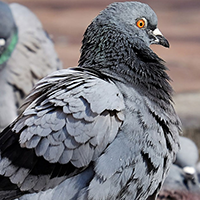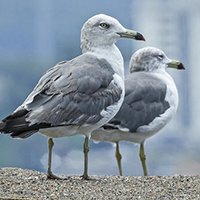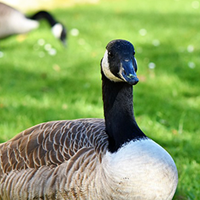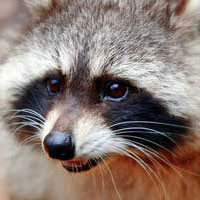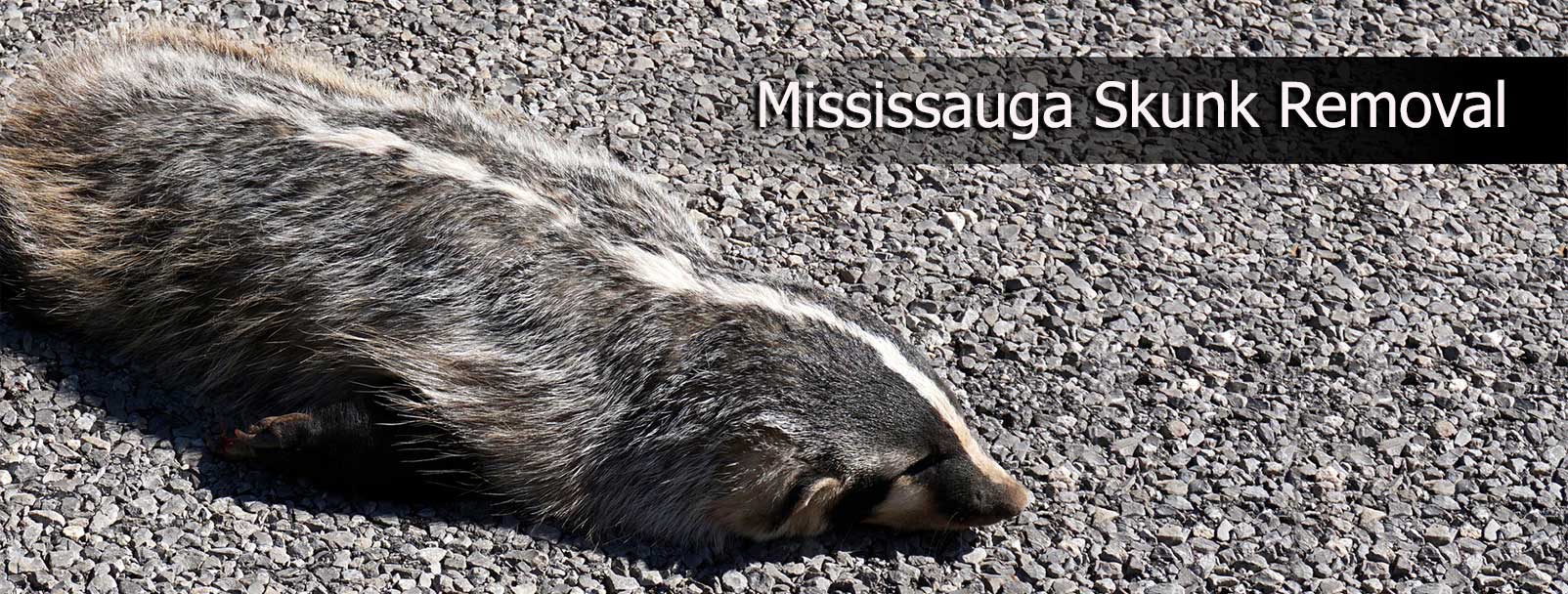
Getting rid of skunks in Mississauga
Guaranteed Skunk Control and Removal from homes, properties, and businesses in Mississauga is just one of the services we offer here, at Hawkeye.
Unlike other Mississauga Area animal control companies, as a licensed furbearer trapping company Hawkeye can employ raccoon control methods IN ADDITION TO relocation of captured animals in the Mississauga Area. This is why we guarantee the permanent removal of squirrels and other wildlife. Call 416.429.5393 if you're having trouble with urban squirrels - Hawkeye's technicians are standing by at our Mississauga offices.
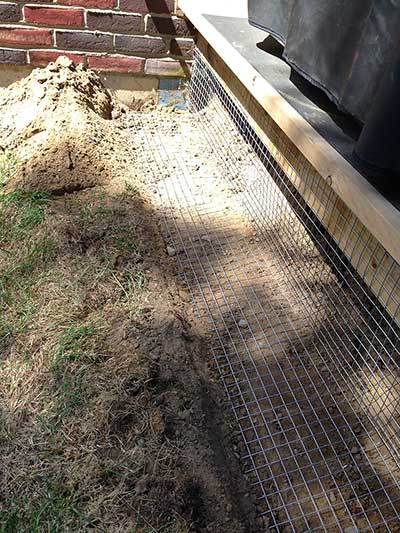
Of course, during this time of year skunks are not only looking for a suitable partner, but also for a safe and protected den to have and raise their offspring. They are skilled and diligent diggers, and like to make their dens in holes underground and/or under structures. Hopefully, you inspected your home and yard last summer or fall and made repairs where necessary to prevent nuisance wildlife from getting under your deck or porch. You may have installed an underground ¼” wire mesh to prevent skunks from getting under. An example of excluding skunks:
The skunk is one of four wild animals (including the fox, raccoon and bat) considered to be primary carriers of rabies and is, therefore, classified as a rabies vector species. Skunks are also known to carry leptospirosis.
What attracts skunks? What should you avoid doing to deter skunks?
Of course, you’ll want to make sure your garbage bins are well secured and there are no other food sources readily available. And, as much as we all love watching the traffic to and from our bird feeders… bird seed will also attract skunks (and squirrels). So will the presence of smaller birds and their nests (eggs). If you can, avoid feeding your pets outside and store your pet feed indoors.
But what do you do, if despite your best efforts you find yourself hosting a skunk or five? How do you get your skunk(s) to leave?
- You can employ what is called “Humane Harassment”. This entails making a perfectly dark and quiet spot... well, not so dark and quiet. Install bright lights at the entrance and point them into the dwelling, play the radio at high volume (talk radio – they aren’t fond of human voices), and place rags soaked with apple cider vinegar or ammonia (bleach) by the entrance. In other words, turn their 5 star all inclusive into the youth hostel from hell. You’ll need to keep this up for at least 3 days and nights – patience and persistence is key. Chances are that momma skunk (wishing to be, expecting, or having a litter already) will move herself and any wee ones to a place more suitable for child rearing.
Speaking of babies… here’s what you should know: After a sixty day gestation period, female skunks give birth to a litter of pups in April or May. Older females come into estrus earlier in the season than younger females and, therefore, have their litters earlier in the spring. Older females also tend to have larger litters. Typically a litter consists of four to seven babies (although, as many as nine have been recorded). One male may mate with several females and won’t stick around after. After mating, female skunks leave their winter den in search of the perfect maternal den. Interestingly, mothers and their offspring sometimes live in communal dens.
The young are blind and deaf at birth with short, fine fur. Momma skunk nurses the little ones for about six weeks before introducing them to the world outside their den. By this time, the babies are miniature replicas of momma skunk. The young are weaned by about two months of age. The family group breaks up in the fall and the young’uns move off to college. Just kidding… they find their own territory. They may travel about six to ten km in search of a new home; however, extremes of up to fifty km have been noted.
- You can try a ‘repellent’ – such as used cat litter. It simulates a predator in the area and momma skunk may decide to pitch her tent elsewhere. As a side note: Please try to avoid commercial repellents based on predator urine - these products are created under very inhumane conditions. Additionally, they really provide no better success rates than home remedies (such as the kitty litter).
- One way doors work great – if there are no babies. Please, please, be sure there are no babies. If you prevent momma skunk from caring for her little ones, you are condemning them to a horrific death.
- Trapping works well – if there are no babies. You’ll also need to remember that animals may not be relocated farther than 1km from where they were captured. This is a job for the professionals. Call Hawkeye at 416-529.5393 – we’re here to help. We have very specific licenses and permits that enable us to offer you options other pest animal control companies simply cannot.
- You can decide to do nothing at all. Skunks typically stay in their dens for fairly short periods. Skunk babies are grown and ready to strike out on their own by the end of summer. If you can stand it that long, you can then close off any access points to prevent other animals from using the den in the future.
Why Hawkeye?
We GUARANTEE results. We offer PERMANENT solutions above and beyond what other companies can offer. Hawkeye is the ONLY pest bird and animal/wildlife control company in Canada designated "Certified Wildlife Control Professional" AND holding the following licenses:
- Trapping of Fur Bearing Animals Permit: In contrast to all other companies, we can euthanize the bird or fur-bearing animal, thus guaranteeing it will not return.
- Falconry Permit: We use Birds of Prey (hawks, owls, falcons, eagles) to scare, chase, or remove in a natural and humane way.
- Pest ControlLicense: We can employ chemical solutions to certain problems. These methods include natural pesticides.
Contact us today or email us at [email protected] if you need help with Skunk Control and/or pest animal removal in Mississauga.
Pest wildlife animals like Bats, Bears (Black, Brown), Beavers, Bobcats, Cats - Domestic (Feline), Chipmunks, Coyotes, Deer, Elk, Fox, Groundhog, Marten, Mink, Moose, Muskrat, Porcupine, Possum/Opossum, Rabbits, Raccoons, Skunks, Squirrels (Black, Grey, Red) and Lynx

About Hawkeye Bird & Animal Control
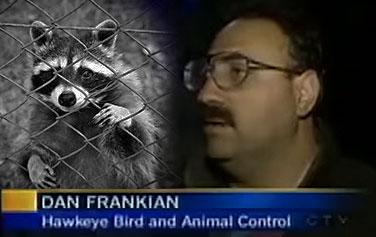
Founder Dan Frankian holds a Canadian commercial falconry license, a Master Falconry Permit in the State of Florida, an Ontario Fur Managers license for commercial fur and trapping nuisance wildlife as well as numerous firearms licenses, Advanced Wildlife Control Operator, Exterminator License, is Bats Standard Certified, and a Certified Urban Marksman. Dan is the ONLY CWCP (Certified Wildlife Control Professional) IN CANADA plus holding CWCP certification in the US. He is also a graduate of the Embry-Riddle Wildlife Hazard airport course. Mr. Frankian is a sought after expert on wildlife control matters and frequently speaks to the media and at conferences.
Hawkeye Bird and Animal Control is your one-stop solution for Skunk Control and Skunk Removal in Mississauga; from capture to removal and exclusion methods for the future. Call us today! 416.429.5393













